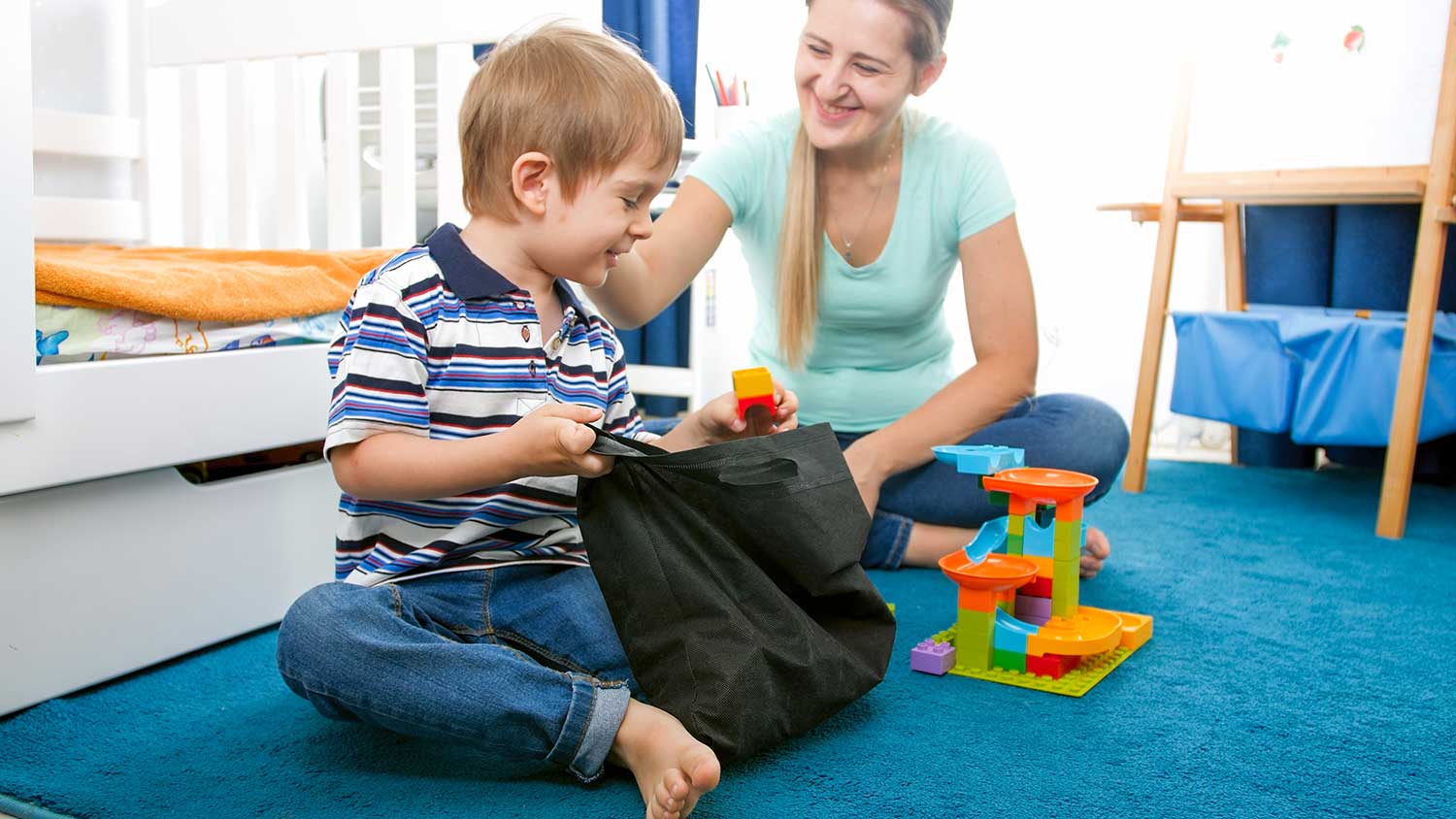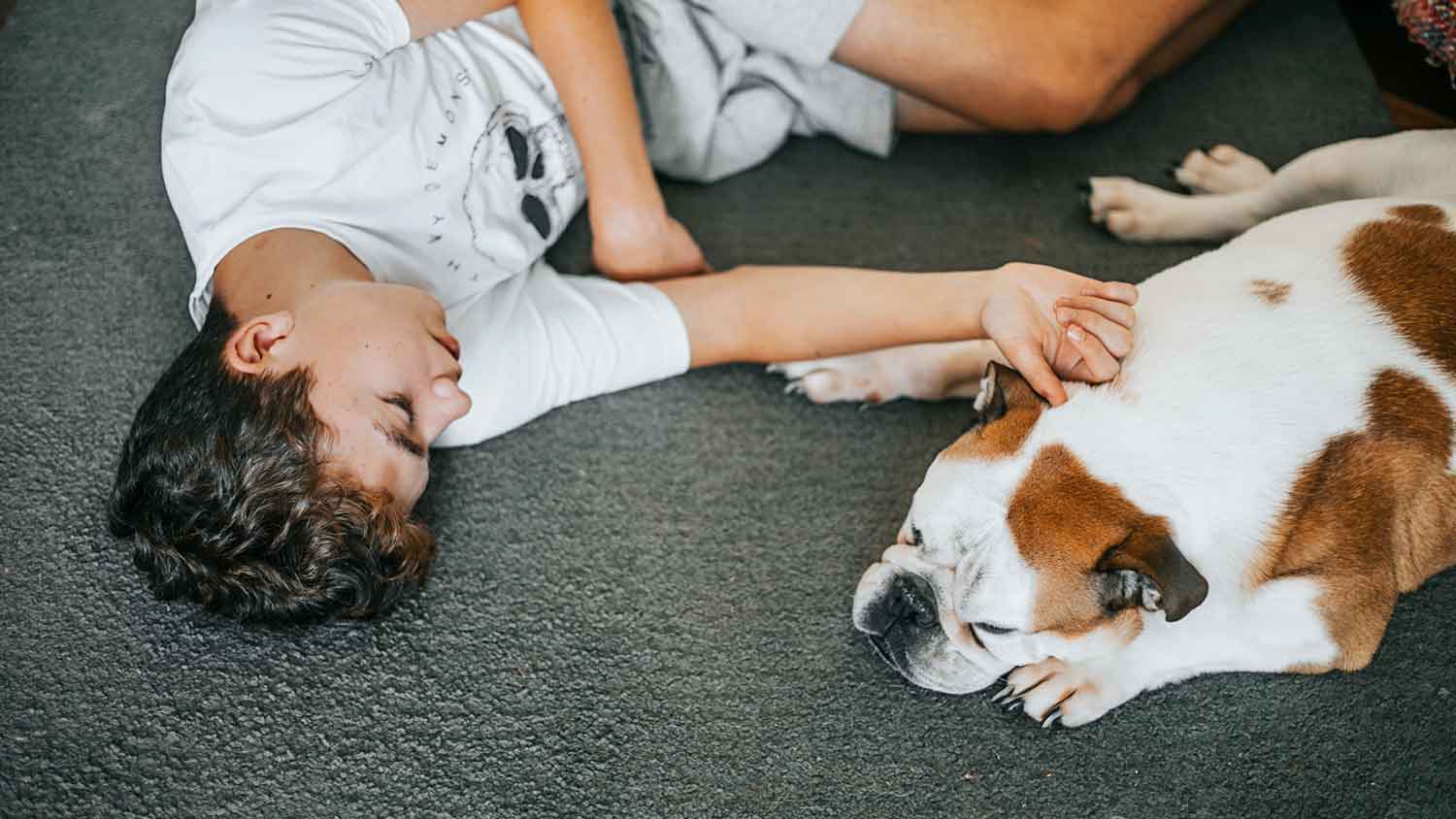
How much does carpet cleaning cost when it's time to bring in the pros? Read about all the little details you need to know to keep your carpet fresh.
Don't keep brushing this easy chore under the rug


Wall-to-wall, area rugs, and runners—all of our carpets deserve equal attention. Learning how to clean carpets properly, however, depends on whether you're completing a routine vacuum, deep cleaning, or tackling a persistent stain. It turns out that each of these instances requires equal care and a little more finesse than simply breaking out your vacuum for a quick pass. Let's take a look.
When you properly care for them, carpets should last about a decade before you need to replace them. Their longevity depends on the amount of traffic and how much dirt and grime wear down their fibers. When we regularly remove dust, dirt, and stains, the fibers will retain their color, softness, and ability to bounce back when stepped on.
Carpets are also a prime place for allergens to gather, especially if you have pets. It's important to keep up with cleaning before the fur, dander, and dust can compact below the carpet fibers. Speaking of pets, cleaning your carpets regularly can also help fight off pet odors, either from accidents or just everyday pet traffic.
Here's an easy schedule on when and how to clean carpets:
Vacuum or sweep: One to two times a week
Deep clean or call a pro: Once a year
Treat stains: As soon as they occur
All the supplies you need to clean a carpet cost between $50 and $75 a year when you're cleaning it yourself. This price includes the cost to rent a steamer and any additional detergents or homemade DIY products. If you don't already own one, the cost of a new vacuum can cost anywhere from $50 to $1,000, depending on the brand and complexity of the model.
If you choose to call a professional carpet cleaner, expect standard service to cost between $120 and $230 and steaming to cost about $300.

Depending on your chosen method, you may have little to prep before cleaning your carpet. Move small furniture items out of the way for basic cleaning and shift larger items when performing a deep clean or steam. Before vacuuming or steaming, always scan your carpet for small items that can get stuck in the machine, like bobby pins, coins, and small pet toys.
Above all, opt for cleaning products that are gentle on the fibers of your rug and don't wear them down further. There are several products you should never use on carpets, for example, such as bleach or abrasive cleaners.
Lastly, if you're removing stains from your carpet, you may need to pretreat the area before breaking out the steamer.
Not all parts of your carpet receive the same level of wear and tear. As we dive into the best ways to wash carpets, keep in mind that high-traffic areas often require a bit more TLC than the rest of the space.

Vacuuming a room may sound like a simple skill to review, but there is an art to it. Be sure to vacuum each carpet in your home one to two times a week, or more if you have a furry pet shedding his winter coat. Here are the common steps of how to vacuum a room the right way.
Clean out the collection bin before vacuuming.
Set the vacuum brush to the correct height of your carpet.
Move all furniture out of the way and check for large debris.
Move over your carpet slowly, taking your time both backward and forward.
Focus on high-traffic areas by making several passes in this area.
Switch on the brush for the carpet, but be sure to turn it off when transitioning to hardwood floors.
Change your vacuum filters according to your user manual.
Baking soda can absorb odors and oils from your carpet without having to add a fragranced cleaner. If you're concerned about odors:
Sprinkle a thin layer of baking soda on your carpet once a month.
Let the baking soda sit for at least an hour to absorb oils.
Vacuum regularly to remove all baking soda.
Like baking soda, white vinegar can neutralize odors built up on your carpet. Vinegar is not right for all carpets, however, and can risk the stability of the dyes. Always test a small area of your rug with the watered-down vinegar solution before spraying the whole rug. To clean your carpet with water and vinegar:
Vacuum your carpet to remove the initial layer of dust and hair.
Combine three parts water with one part white vinegar in a spray bottle.
Lightly spray a few square feet at a time with the solution without soaking it.
Blot the area with a cloth or paper towel.
Allow the area to dry fully.
Vacuum your rug again to remove any remaining debris.
Salt combined with baking soda or borax can create a thick paste that takes care of deeper carpet odors. Combine equal parts salt, baking soda, and borax, or two of the three, with a few tablespoons of water for an abrasive and neutralizing paste. Always wear gloves when working with products like borax to avoid skin irritation.
Here's how to use it on your carpet:
Test a small area of your rug to make sure the dye can handle the mixture.
Vacuum the carpet for loose debris.
Spread a thin layer of the paste over your rug.
Use a soft-bristled brush to move the mixture through the carpet fiber.
Spray the area with a thin mist of water from a bottle.
Let the mixture dry.
Vacuum up the remaining salt, baking soda, borax, and dirt with another pass from the vacuum.
There are plenty of carpet cleaning solutions on the market that cater to general cleaning needs, pet odors, stains, or all three. Be sure to read the instructions on your bottle thoroughly, especially if it recommends leaving the carpet to dry without traffic for a set amount of time, which is a common requirement. Be sure only to use gentle solutions when cleaning an Oriental or Persian rug, as these materials can be more delicate.
Whether you just launched a glass of wine off the coffee table or your Golden Retriever tracked in something suspicious from outside, always try to treat carpet stains ASAP. The sooner you blot or remove solid parts of the stain, the easier it will be to get out down the line.
While removing each type of stubborn stain from carpets requires a different solution, common items like vinegar, baking soda, and salt will do the trick. Overall, you should always blot the stain lightly, careful not to press it deeper into the fiber. Move your cloth in a small circular motion from the outside to keep it from spreading. You may need to make several passes with thicker cleaning solutions to remove the stain.
Here are some top examples of how to wash carpets for each type of stain:

Steam cleaning a carpet may sound like a complex job, but it is surprisingly very DIYable. You can rent a steam cleaner from your local hardware store for between $35 and $50 for the day, plus a bottle of steam cleaning solution for about $25.
Steam cleaning uses steam, suction, and cleaner to break up dirt and grime in your carpet, including tricky stains. Your steam cleaner will include very specific instructions on how to use the model, but here are some basic steps on how to clean carpets with a steamer.
Vacuum your carpet to remove loose debris.
Dust the rest of the room to avoid it from falling on your rug while steaming.
Fill the tank of your steamer with water according to the instructions.
Activate your steamer, pressing the trigger when you're ready to release steam and cleaner.
Move from the outside of the room and move inwards, moving back and forth according to the instructions on the cleaner.
Be sure to empty and replace the dirty water regularly.
Ventilate the room and place fans in the area if possible.
Allow your carpet to dry fully before walking on it.
If you don't have a vacuum or steamer handy, you can clean carpets without a machine as well. Carpet brushes have thick enough bristles to get into the fibers of the rug and shake dirt and grime free. Lightly spray your carpet with water or a solution of water and white vinegar or the past of salt, borax, and baking soda we noted above.
Move the brush in a circular motion to remove dirt, and then blot the area with a paper towel or microfiber cloth. As always, allow the rug to dry before returning furniture or walking on it.

Support your carpet-cleaning efforts by keeping your carpets looking good in between cleanings as well. Stopping the source of the dirt and heavy traffic will prolong the life of your carpet even further. Here are some tips to keep in mind:
Dust the rest of the room regularly to keep it from collecting on the carpet.
Hire a local air duct cleaner to remove dirt and pet hair from circulating air.
Switch to a shoes-off or socks-only home.
Move your furniture every several months to cut down on high-traffic wear.
Keep a consistent vacuuming and cleaning schedule.
Always let your carpet fully dry after washing to avoid mildew buildup.
While there are many options to clean carpets yourself, knowing how to hire a professional carpet cleaner can come in handy. Professionals will have a sharp eye for getting out stains, removing difficult odors, and even salvaging carpets that you're considering replacing. You can also call a professional carpet cleaner when you move into a new home or are about to sell your house.
Remember, you will pay up to $300 on average for steaming, but professional carpet cleaning is an excellent alternative to breaking out the steamer yourself.
From average costs to expert advice, get all the answers you need to get your job done.

How much does carpet cleaning cost when it's time to bring in the pros? Read about all the little details you need to know to keep your carpet fresh.

Looking to clean your carpets and breathe new life into your living space? Use this guide on how to choose the best carpet cleaning company to get started.

Wondering how often to get your carpets professionally cleaned? Learn the ideal schedule to keep your home fresh, clean, and allergen-free year-round.

Discover how to clean vomit from carpet through one of three ways, depending on when you get to the unpleasant task using DIY or retail cleaners.

Waiting for your carpet to dry and not sure how long it will take? That depends on humidity, the type of carpet, and the cleaning and drying processes used. Learn the average time for carpet to dry so you know what to expect.

Don’t have a steam cleaner? It’s time to roll up your sleeves. This guide will show you how to clean carpet without a carpet cleaner.